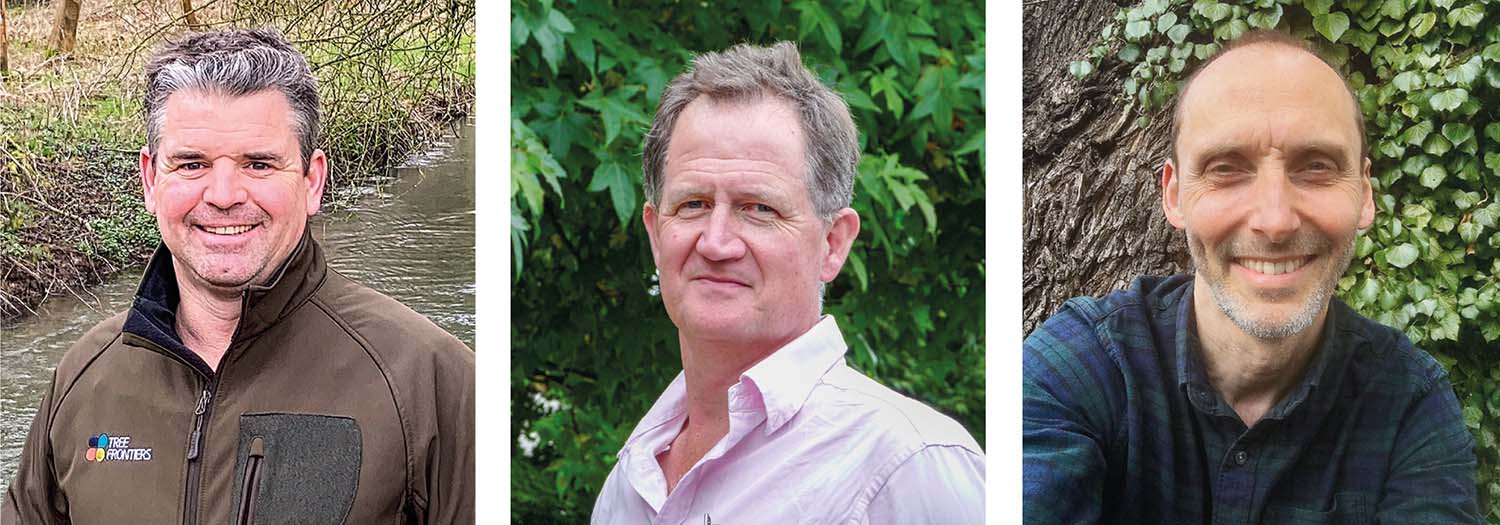We are delighted to welcome three new Registered Consultants who have successfully completed their application assessment and interview, and who now appear on the Association’s website at www.trees.org.uk/Registered-Consultant-Directory. Congratulations to Nick Bolton, Dr Jon Heuch and Matt Reid! Here Nick and Jon share their thoughts about the journey to AARC.

From left to right: Nick Bolton from Oxfordshire, Dr Jon Heuch from Kent and Matt Reid from Gloucestershire
Nick Bolton
Joining the Registered Consultants Scheme has been a long-held ambition and one that I am very proud to have finally achieved. The journey has not been an easy one, but of the many things that one hears when preparing an application, one particular element stands out: however good you might think your reports are, the process makes them better and shines an intense spotlight on areas that otherwise might seem a little obscure.
However, my journey has been subject to one particular facet that I would like to comment on and that is how the new application process, introduced in 2021, compares to the original. My first application to become a Registered Consultant was made under the ‘old’ process. Six reports had to be prepared on six technical areas and these were then subject to the assessors’ scrutiny. Under the ‘new’ process, a total of five reports have to be submitted, but chosen from 19 technical subject areas. Surely, therefore, it must be easier to apply under the new scheme?
From my experience, I do not believe this is necessarily the case. The new compulsory area on Business Practice was tough, and this was in spite of running my business in accordance with ISO standards (9001, 14001 and 45001 – look them up). I thoroughly recommend that anyone thinking of applying to become a Registered Consultant seeks help in working towards these standards as it certainly was a huge help in getting everything pulled together for the assessment (thank you, Paul Elcoat).
There is then the task of choosing four additional reports from the technical areas. There is no question that having more topic areas makes the selection process easier, but there are subtle differences between some of these that meant I needed to give much more thought as to which reports I would submit. This strangely made it tougher, but once the decision on which topics I would be submitting reports from was made, the biggest change I found in this area was in the guidance notes. The separation of detail between the ‘submission description’ and the ‘competency guidance’ was invaluable in helping to make sure that the submitted reports were prepared to the standards that the Scheme requires. In that respect, the application process the second time around was easier, but when it came to the assessment itself things were definitely unchanged, with the same level of rigour and scrutiny applied both times.
And so, to conclude, what would my advice be to anyone thinking about applying? First of all, I would say ‘Go for it!’ The time spent in preparing the application made me a better consultant before I had even submitted an application. For that, I have to thank those who mentored me and gave me feedback on my reports. And that would be the second bit of advice – approach someone who knows the Scheme and get mentored through the process. It offers no guarantees of success, but the learning curve is steep and very beneficial. The challenge is now to maintain the standards which I have been assessed against and be ready for a quality assurance review in five years’ time.
Jon Heuch
As a trustee of the Arboricultural Association between 2007 and 2016 and Chairman in 2010 (when I also ran the London Marathon), I have heard a fair amount about the Registered Consultants Scheme over the years. I attended the consultants’ development day whilst a trustee and learnt what consultants thought of the scheme and how they thought it could be improved.
I even started to fill the application form in around 2008 with the signatures of two RCs, but work took over and it took the notice that the application system was going to change to push me to submit the form shortly before the deadline in 2021.
It is a daunting task to review previous reports knowing that they are going to be peer reviewed. Finding time to do that with a backlog of work was difficult. Providing the range of work of an adequate standard was also a challenge as I deal with many subsidence, legal and tree preservation cases but fewer other cases.
The Scheme has its attractions for a number of reasons. Firstly, it is reassuring to know that having stuck one’s head above the proverbial parapet, I am doing the right thing in terms of report writing. Secondly, it is a useful means of promoting oneself and differentiating oneself from the crowd. The Scheme must compete with the likes of Google, Expert Witness promotional services and other professional organisations’ websites. There is an ongoing challenge for the AA to not only make sure the Scheme is the first point of call for other professionals, but also that there is sufficient capacity within the RCs to cope with that demand. I look forward to working with the AA to meet that challenge.
Find out more about the application process at www.trees.org.uk/Accreditation/Become-an-AA-Registered-Consultant. The next deadline for applications is Thursday 1 September 2022.
This article was taken from Issue 197 Summer 2022 of the ARB Magazine, which is available to view free to members by simply logging in to the website and viewing your profile area.